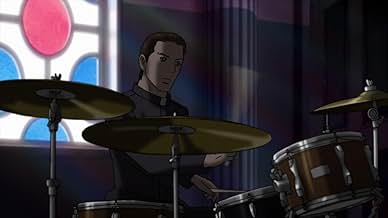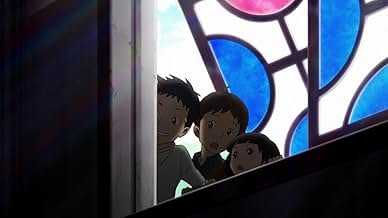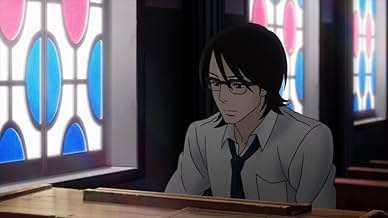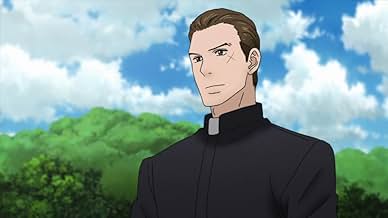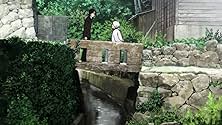IMDb RATING
8.1/10
3.7K
YOUR RATING
Two different students - a successful but aloof academic and a rebellious but kindhearted delinquent - form a friendship through their love for music.Two different students - a successful but aloof academic and a rebellious but kindhearted delinquent - form a friendship through their love for music.Two different students - a successful but aloof academic and a rebellious but kindhearted delinquent - form a friendship through their love for music.
- Awards
- 1 win & 2 nominations total
Browse episodes
Featured reviews
As an older person who isn't into anime I have nevertheless watched all of Watanabe's works and find this one to be my absolute favourite. Don't be put off by the fact that Cowboy Beebop or Samurai Champloo are more popular and highly rated than Kids on the Slope. This has probably got more to do with the fact that you are more likely to appreciate Kids on the slope if you have a passion for music and know how it can bring people together. It also helps if there is some distance between your school days and now, as older people have a much warmer place for that period in their life and know to place a higher value on it.
This show works wonderfully well as a 4 hour movie and manages to capture the naivety, innocence and passion of youth in all it's charming glory. Personally, having changed schools and countries throughout my childhood, as well as loving music, and having experienced the way music always made new friends for me, some which still last to this day, I can say that this series is overwhelmingly powerful and true in every sense. To laugh and cry with a smile on your face and remember the first time you heard Bill Evans, Miles Davis, or the rhythm section on Coltrane's My Favourite Things and be shocked by beauty once again.
If any of this sounds familiar to you, buy it, watch it. And then watch it again every year or so.
This show works wonderfully well as a 4 hour movie and manages to capture the naivety, innocence and passion of youth in all it's charming glory. Personally, having changed schools and countries throughout my childhood, as well as loving music, and having experienced the way music always made new friends for me, some which still last to this day, I can say that this series is overwhelmingly powerful and true in every sense. To laugh and cry with a smile on your face and remember the first time you heard Bill Evans, Miles Davis, or the rhythm section on Coltrane's My Favourite Things and be shocked by beauty once again.
If any of this sounds familiar to you, buy it, watch it. And then watch it again every year or so.
One might expect something a bit different for Shinichiro Watanabe's first anime series in ages. Rather than the kind of genre-fusion madcap adventures for which Watanabe became famous for (Cowboy Bebop and Samurai Champloo), Kids on the Slope is a gentle coming-of-age drama about a pair of teenage boys who don't fit in and find release through jazz music. Well, it's not that much of a surprise if you saw his short film Baby Blue, but it's still worth applauding such a doggedly realist show in a medium that specializes in flights of fancy.
Indeed, Kids on the Slope is at its best when it flows with the languorous, irregular rhythm of jazz, letting us soak in the aesthetics and hang out with its characters. The animation is beautifully done, and the music is of course excellent (and what's more, we actually see the characters playing the notes -- no Nodame Cantabile-esque still frames here). The attempts to interject drama, especially towards the back half of the series, take away from this appeal a bit, but even at its most serious Kids on the Slope is never melodramatic.
The main attraction here is the relationship between Kaoru and Sentaro, a curious mix of friendship, rivalry, and admiration. They drag each other towards something approaching adulthood, even if there's always a distance between them. Anime has plenty of shows about male-male bonding, but few have a central relationship as complex as this one. Ritsuko, the third wheel to this bromance, is handled less well and never really comes off as more than a love interest.
Along the way there are historical subplots, moments of ambiguous redemption, a hilarious wannabe pop band, and more jam sessions than you can shake a drumstick at. It doesn't live up to Cowboy Bebop, but nothing does, and unlike Samurai Champloo, Kids on the Slope doesn't really try. Instead, it's its own thing, strange and a little funky, but ultimately pretty enjoyable.
Indeed, Kids on the Slope is at its best when it flows with the languorous, irregular rhythm of jazz, letting us soak in the aesthetics and hang out with its characters. The animation is beautifully done, and the music is of course excellent (and what's more, we actually see the characters playing the notes -- no Nodame Cantabile-esque still frames here). The attempts to interject drama, especially towards the back half of the series, take away from this appeal a bit, but even at its most serious Kids on the Slope is never melodramatic.
The main attraction here is the relationship between Kaoru and Sentaro, a curious mix of friendship, rivalry, and admiration. They drag each other towards something approaching adulthood, even if there's always a distance between them. Anime has plenty of shows about male-male bonding, but few have a central relationship as complex as this one. Ritsuko, the third wheel to this bromance, is handled less well and never really comes off as more than a love interest.
Along the way there are historical subplots, moments of ambiguous redemption, a hilarious wannabe pop band, and more jam sessions than you can shake a drumstick at. It doesn't live up to Cowboy Bebop, but nothing does, and unlike Samurai Champloo, Kids on the Slope doesn't really try. Instead, it's its own thing, strange and a little funky, but ultimately pretty enjoyable.
Shinichiro Watanabe is as close to a cult anime director as you get and with Kids on the Slope he addresses directly the stylistic thread that runs through everything he does, music.
Kaoru Nishimi is the buttoned down, classically trained protagonist, carrying his emotions bundled up in his suitcase through an endless carousel of schools and communities. Never having time for friends or even acquaintances, and drawing his only pleasure from the structured performance of classical piano. The series begins with the door to his sheltered existence creaked open by the self-styled drummer Sentaro Kawabuchi. In a cacophony of fists, romance, and blaring jazz, Sentaro awakens Kaoru to the wonders of expression.
Shinichiro Watanabe, along with composer Yoko Kanno, has sketched a nostalgic portrait of 60s Japan, and in what i'm sure are touches of autobiography shown an adrift young man find a home in the beautifully flawed world of jazz. Watanabe draws his characters with a loving hand, appreciating nuance and weakness as part and parcel, however this adoration can sometimes come across as sentimentally watery. But the show is made with a joy that leaps out from every vivid image and roaring musical number, that would suppress any criticism in sheer enthusiasm.
Drawing from the American Beatniks and his own experience Watanabe produces a delicate character play enriched by one of the finer soundtracks i've heard.
Kaoru Nishimi is the buttoned down, classically trained protagonist, carrying his emotions bundled up in his suitcase through an endless carousel of schools and communities. Never having time for friends or even acquaintances, and drawing his only pleasure from the structured performance of classical piano. The series begins with the door to his sheltered existence creaked open by the self-styled drummer Sentaro Kawabuchi. In a cacophony of fists, romance, and blaring jazz, Sentaro awakens Kaoru to the wonders of expression.
Shinichiro Watanabe, along with composer Yoko Kanno, has sketched a nostalgic portrait of 60s Japan, and in what i'm sure are touches of autobiography shown an adrift young man find a home in the beautifully flawed world of jazz. Watanabe draws his characters with a loving hand, appreciating nuance and weakness as part and parcel, however this adoration can sometimes come across as sentimentally watery. But the show is made with a joy that leaps out from every vivid image and roaring musical number, that would suppress any criticism in sheer enthusiasm.
Drawing from the American Beatniks and his own experience Watanabe produces a delicate character play enriched by one of the finer soundtracks i've heard.
If you've ever in your life sat down and spent some free time watching anime, odds are you've heard the name Shinichirō Watanabe and Yoko Kanno. With two of the best well-known names in anime, you will not be disappointed when you get high hopes for this piece of work. My purpose of this review is not to go in depth of the story or its characters, but to hopefully help those who are undecided about putting this one on their watch-list.
The animation is incredible, the colors perfect, as expected the score is remarkable, character development is on point, and this story can be quite touching at times. I'm usually not interested into the more drama driven anime, but Kids on the Slope is an easy exception.
But to make the point perfectly clear, if you're debating watching Kids on the Slope, stop debating and watch it, period.
The animation is incredible, the colors perfect, as expected the score is remarkable, character development is on point, and this story can be quite touching at times. I'm usually not interested into the more drama driven anime, but Kids on the Slope is an easy exception.
But to make the point perfectly clear, if you're debating watching Kids on the Slope, stop debating and watch it, period.
Its seriously an amazing anime. its one of my favorites! but sadly it is very overlooked and underrated. The reason i tried this in the first place is because i was watching all the generic anime like Naruto, Attack on Titan, Soul Eater, and the like and i just wanted to try something different, specifically dramas. But the thing is i hate the kind where people get dramatic over little things like "You stole my hair brush!Jason's hair was in that brush! You're going down!!!" god! i don't know why anyone would like that. This on the other hand is a really down to earth, feel good, coming of age drama with likable characters. Just give it a try!
Did you know
- TriviaThe series title "Sakamichi no Apollon", means "Apollo of the Slope". Apollo is the Greek god of music.
- Crazy creditsEach episode is named after a jazz song.
- ConnectionsFeatured in WatchMojo: Top 10 Slice of Life Anime (2018)
Details
- Release date
- Country of origin
- Official site
- Languages
- Also known as
- Аполлон зі схилу
- Production companies
- See more company credits at IMDbPro
- Runtime
- 24m
- Color
Contribute to this page
Suggest an edit or add missing content




